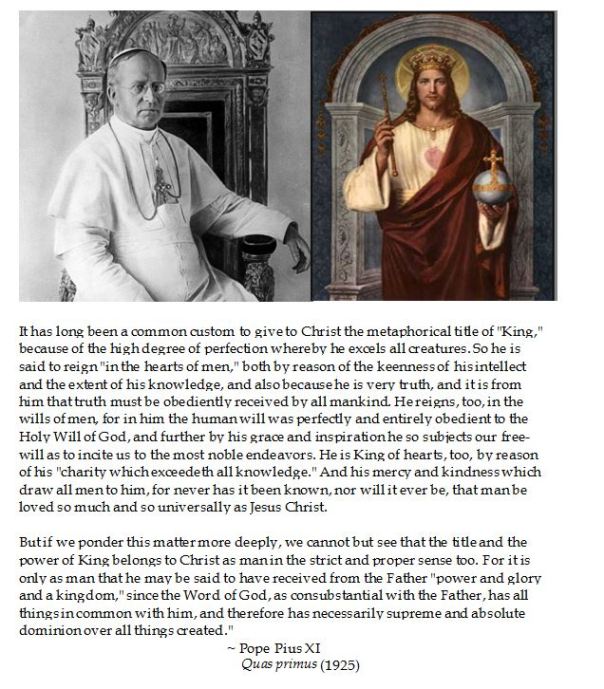
Many of the Catholic Faithful appreciate the Feast of Christ the King as marking the end of the liturgical year. Those who pay attention to the scriptures explore eschatological issues.
But it is useful to understand why the Feast of Christ the King was added to the Church calendar in 1925, through Pope Pius XI's Apostolic Letter Quas primus (1925). The Feast of Our Lord Christ the King emerged at a time in which nationalism, secularism, fascism and communism was sweeping the world. It was placed as the last Sunday in October, and was intended to give the faithful strength and courage to live the Kingdom of God in this world.
In a motu propio Mysterii Paschalis (1969) by Pope Blessed Paul VI, the feast was moved up to be a Solemnity and given a new formal name "Our Lord Jesus Christ, King of the Universe". By moving it to the last Sunday on the liturgical calendar, the significance of last things becomes more poignant.
Many Protestant and Orthodox Christians, such as the Anglicans, Lutherans and the Russian Orthodox outside of Russia followed the motu propio after 1970 and moved celebration of "Christ the King" to the last Sunday before the start of Advent.
H/T: Fr. Geoffrey Plant, St. Michael's Catholic Church, Lane Cove, Archdiocese of Sydney, Australia

The Russian Orthodox Church Outside Russia, as the rest of the Orthodox Church has no "Sundays in Advent". The Orthodox Church keeps a Fast from 15th November until 24th December inclusive together with many liturgical texts in expectation of the Nativity of Our Lord. Compare the practice of the Church in Milan. However, the Orthodox Church continues the sequence of Sundays after Pentecost until Christmas Eve, and the Fast is called the Christmas Fast, never Advent. The Feast introduced by Pope Pius XI in honour of Christ the King, as all feasts introduced in the West in the second millennium are unknown in the Eastern Church Liturgical observance, if only because they do not accept that the Pope has any authority over them. The inclusion of the Russian Church Outside Russia in the list of Churches observing this Feast or any motu proprio of the Pope is an anomaly, and entirely mistaken.
ReplyDeleteB Flat Thank you for that explanation. It seems that my sourcing from the Fraternity of St. Gregory the Great http://bit.do/bvTuf) had it wrong, even though "Christ the King" is reflected on the Sunday before Advent begins in their Julian calendar.
ReplyDeleteBut it is not surprising that many non-Catholic (mainly Protestant) churches realigned their missals after Vatican II. This reflected the spirit of collegiality and non-voting participation during V-II, not that the Pope in Rome exercised any authority over them
The latter half of your comment strikes me as typical inter-denominational infighting. Rather than celebrate the meaning of the Feast and reflect on how our Messiah reigns despite secular governmental impulses towards godlessness, it seems that you want to score points or reinforce things which have divided the faithful for nearly a millennium. Good for you! Bad for the Body of Christ.
At a time when 148 Christians were slaughtered on Maudy Thursday for their faith or 21 Coptic Christians (one post humorously designed) were martyred by ISIS beheadings http://goo.gl/eqeR9m, it is sad that were are not motivated to live the virtuous admonition of Peter Meiderlin, a Lutheran theologian who implored "Unity in necessary things, liberty in dubious things and charity in all things". http://bit.do/bvTwC
You have misinterpreted the intention of my post to your otherwise excellent article. I follow this blog, and many other blogs of Traditional Catholics because I care about what is happening in the world.
ReplyDeleteMy personal conviction is that it was the Roman Catholic Church, in all its members, faithfully guided throughout the world by the Papal teaching on social as well as dogmatic and moral issues, which kept the world Christian. No other Christian body had any global, or even national, influence, while Soviet Communism remained in power. Only the wilfully ignorant deny that the collapse of Christianity in the developed world is contemporaneous with the Catholic Church's embrace of the World following Vatican II. With the exception of Humanae Vitae, which was a failure within the Church in the developed world, subsequent authoritative Catholic teaching from Rome has had no resonance worldwide. I believe this is because of the collapse of Catholic solidarity in practicing the Faith within most of the developed world, especially in English-speaking countries where the collapse of practice is ubiquitous.
All Christians have Christ as King in their hearts.This is lived out and visible in different ways in their traditions. The liturgical celebration of Christ the Universal King once a year is only a highlight of the reality, or else it has no reality at all. Compare the celebration of Christmas to appreciate what I mean by that.
All Christians must mourn the loss of so many who no longer submit to Christ, and whose children do not here of Him. That loss is due in great measure to the collapse, I repeat, of the Catholic Church. I am grateful to the Catholic Church for my own upbringing and education. I would not try to score cheap points against her; the Church which produced such great saints, so many millions of heroic workers in the missions, in charitable work, and in dutiful pastoral care for generations. Truly, may Christ be King in every heart and every place!
It is the contemptuous neglect and wilful destruction, by prominent members of the hierarchy from the 1970's to the present day, of the heroic and selfless work, teaching, and good example of these past generations, which fills me with sorrow and disgust. I read these blogs to encourage my heart that not all is lost. God bless you